
 Flash News
Flash News
Diaspora votes, counting process for political entities in 12 districts concludes
Government media invents the article about the "reaction of DP figures" against Berisha & LaCivita. The author does not exist and the text is a product of ChatGPT (whichs says it's fabricated)
Crashed by a 16-year-old on a motorbike, the elderly man ends up in the Shkodra hospital
Foreign exchange, May 18, 2025
Knife wound in Durrës, perpetrator on the run

Years ago, various opposition forces strongly demanded the creation of a postal voting system, which would bring to the Albanian political scene the votes of immigrants, who, it was assumed, would vote free from the abusive schemes of the next party in power. While the votes of immigrants continue to be counted, the fact is that the result so far speaks of an even greater victory for the ruling Socialist Party among voters from abroad than this party achieved, through methods “not in line with international standards” inside the country. The SP has so far secured 52% of the votes inside and 57% outside. The trend is expected to be even more votes for the SP in the boxes waiting to be counted.
Selected numbers
The situation is much more complex than it seems at first glance. The main thing to keep in mind is simple arithmetic. The Civil Registry, where the names of all Albanian citizens are found, contains 4.6 million names, while the last Population and Housing Census found 2.4 million inhabitants in the country. This suggests that 2.2 million citizens live abroad and of these, the assumption is that about 1.7 should be of legal age. Against this figure, which constitutes the potential voting body, about 250 thousand or 15% were registered and about 200 thousand or 12% voted.
It is easy to imagine that the government, because it has much more economic resources and, as international observers say, its abuses of state resources were “widespread,” found it easier to persuade more of its supporters among the Albanian diaspora to participate in the elections. The opposition, with fewer resources, consequently received a weaker result.
Active law and passive law
The invisible, but extremely important change that has occurred with the granting of the right to vote to immigrants is the transformation of the right to vote from a passive right, as it has been until now, into an active right. The first sentence of international election observation reports in the chapter on Voter Registration is that, in Albania, “the right to vote is passive”. This means that no action is required from citizens to have the right to vote. It is enough to be an Albanian citizen and you automatically have the right to vote. In various countries, for example, in the United States, this is not the case. Citizens do not automatically gain the right to vote, they must register. From here arise electoral machines that aim to persuade, facilitate, mediate, or directly pay, for their potential supporters to register to vote.
Vendet ku e drejta e votës është aktive, siç po bëhet në rastin e emigrantëve, të cilët duhet të kryejnë një procedurë regjistrimi për të marrë votën me postë dhe për ta postuar mbrapsht, janë vendet ku politika kushton. Në Shtetet e Bashkuara, organizata të shumta, teorikisht jopartizane, por faktikisht mbështetëse të Demokratëve, punojnë në kuadër të sloganit Get out the vote për të regjistruar sa më shumë qytetarë në zgjedhje. Vlerësimi i përafërt është se vetëm pak më shumë se gjysma e qytetarëve amerikanë janë të regjistruar në zgjedhje dhe votojnë. Sondazhet e panumërta sugjerojnë se ata të paregjistruarit kanë prirje të jenë mbështetës të Demokratëve dhe politikave të tyre sociale kështu që është interes i Demokratëve që të kenë sa më shumë të regjistruar. Në anën tjetër, Republikanët kanë grupet e tyre nominalisht jopartiake të tilla si True the vote dhe që pretendojnë se regjistri i votuesve po abuzohet duke vendosur në të joshtetas. Këta nxisin procedura shtesë dhe kontrolle shtesë për të regjistruarit e rinj në zgjedhje.
Mungojnë 85% e zgjedhësve
Nuk është e vështirë që të marrësh me mend se pse 85% e votuesve potencialë që supozohet se jetojnë në emigrim dhe kanë të drejtë vote në Shqipëri nuk u regjistruan dhe gjithashtu, nuk është e vështirë që të gjykosh se si ndodhi që këta 250 mijë, u regjistruan.
Disa nga emigrantët kanë ikur dekada më parë dhe ndoshta nuk kanë më interes për ngjarjet në Shqipëri ndërsa të tjerë munden të mos kenë dokumente shqiptare të vlefshme dhe mundet ta shohin si të paarsysshme të bezdisen me procedurat. Një pjesë padyshim që nuk e ka pasur të mundur për shkak të kohës së shkurtër.
Sido që të jetë, partia që pati më shumë burime në zgjedhje nuk e pati të vështirë që të rekrutojë më shumë mbështetës nga emigrimi. Situata mund të ndryshojë në zgjedhjet e ardhshme dhe nuk dihet se si do të funksionojë në rastin e zgjedhjeve vendore por ajo që është e qartë është që, me sistemin e të drejtës së votës si e drejtë aktive, politika e mbështetur te paratë e bollshme, në rastin e Shqipërisë, të grabitura nga buxheti i shtetit, ka gjasa do të jetë faktor i rëndësishëm në rezultatin e zgjedhjeve dhe votat e emigrantëve do t’i marrë ajo parti që do të ketë më shumë para.
Politika identitare pati sukses
Ana tjetër e votës së emigrimit është një Shqipëri e ekstremeve. Një kuti nga emigrantët e Beratit tronditi kur rezultati ishte 95% për socialistët, por edhe në anën tjetër, në Shqipërinë e veriut rezultati ishte gjithashtu ekstrem. PD fitoi Kukësin me 62% të votave të emigrimit, ku kutia e parë e numëruar ishte mbi 80%.
Ajo që bie në sy është që, partitë e vogla të marra sëbashku patën performancë shumë më të mirë mes emigrantëve se sa patën brenda vendit. Nisma Shqipëria Bëhet mori 7.9% të votave të emigrantëve dhe 3.5% të shqiptarëve brenda vendit. Dhe Lëvizja Bashkë pati thuajse dyfish normë më të lartë fitoreje jashtë se sa brenda.
It is, however, a small party, which in overall numbers does not matter, that provides a disturbing insight into the politics of the immigrant vote. The Albanian National Alliance, a nationalist party led by Elena Kocaqi, received 0.19% of the Albanian vote within the country and 0.54% of the vote among immigrants. Even the fact that the Albania Becomes Initiative, which also based part of its campaign on the politics of folkloric nationalism, had a much better result abroad suggests that in fact, what is easily guessed also appears at the ballot box. Immigrants, culturally caught between two worlds, fall prey to identity politics more easily than the population within the country.
"Television" voters
The final element that must be taken into account when judging the outcome of the emigrant vote is the fact that man is a product of the information environment in which he exists. The information environment is a concept that includes everything from the information that a person receives at school or university to the information that he exchanges in cafes, on social networks, or the information that he receives from television, newspapers or books.
The general assumption is that, for Albanians inside the country and Albanians abroad, this information environment is currently limited to televisions and the presence of televisions on social networks, while other means of mass communication such as written media or physical books have almost disappeared.
It is also clear that, unlike past elections, when the usual conclusion was that the media was politically influenced but each party had its own media to make propaganda, in recent elections, including the 2023 local elections and the 2025 elections, the conclusion of international observers is what local observers have known for a long time: the media is not simply biased, and not simply supportive of the government. It has ceased to be media and has been transformed into a conduit for materials produced by the government’s propaganda office. Under these conditions, the voter abroad, like the voter within the country, lives in an information regime saturated with government propaganda, which does not hide that it uses administrative resources, such as the Agency for Media and Information, to produce “news” that is supposed to accurately inform a citizen about the various political offers before voting.
Under these conditions, as long as the information environment does not change, the vote of immigrants, like the vote of citizens within the country, will be the vote of an uninformed citizen, a television voter. Reporter.al

Latest news



Pope Leo calls for unity, vows not to be an "autocrat"
2025-05-18 18:26:51

Monika Kryemadhi comes as a film actress, shares footage from the filming set
2025-05-18 17:49:01
Video/ Incident in MMA, Albanian athlete loses consciousness after 100 punches
2025-05-18 17:30:14
Israel announces new offensive in Gaza
2025-05-18 17:13:11



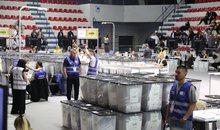
The counting of diaspora votes in Berat and Vlora is completed
2025-05-18 15:51:27
Pope Leo XIV "broke" protocol, hugged his brother at the inauguration ceremony
2025-05-18 15:22:47

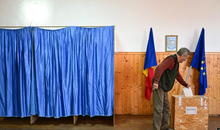
High Romanian turnout in elections that could deepen divisions in the EU
2025-05-18 14:30:03
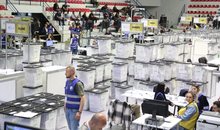
Does the diaspora vote reflect the opinion of immigrants?
2025-05-18 13:47:25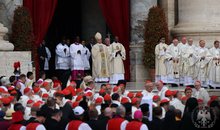
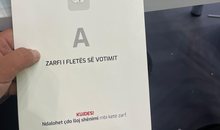


Video/ Footage goes viral, Erdogan forcibly grabs Macron's finger
2025-05-18 12:12:07
Pope Leo XIV's inauguration mass begins in St. Peter's Square
2025-05-18 11:48:16


Foreign exchange, May 18, 2025
2025-05-18 10:43:26
"Rivalry with the Dollar!" The Economist: Can the Euro Become a Global Currency?
2025-05-18 10:28:45

Mexican navy ship crashes into Brooklyn Bridge in New York, 2 dead, 17 injured
2025-05-18 09:37:43
With only two votes difference, Xhaçka takes Gjylameti's mandate in Tirana
2025-05-18 09:10:02
With clear skies and passing clouds, here's the weather forecast for today
2025-05-18 09:02:45
Horoscope for today, May 18, 2025
2025-05-18 08:35:57
Albania shines on the Eurovision stage, ranks 8th
2025-05-18 08:21:33
Morning Post/ In 2 lines: What mattered yesterday in Albania
2025-05-18 08:02:35
Knife wound in Durrës, perpetrator on the run
2025-05-17 21:59:13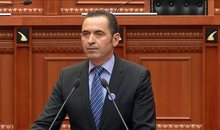

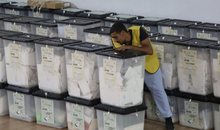
Fier closes the count: These are the MPs who win the mandate
2025-05-17 20:40:04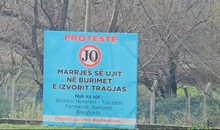
When politics "ditches" even the water source, Tragjasi surrenders to the SP
2025-05-17 20:16:27

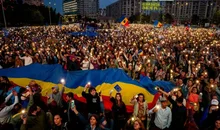
After months of chaos, Romanians prepare to elect president
2025-05-17 19:09:39

Deadly tornado hits two US states, killing 20
2025-05-17 18:18:09


Vučić at rally in Niš, Serbian students organize protest in Subotica
2025-05-17 17:03:26
Iran's Supreme Leader Rejects Trump's Comments on Nuclear Program Proposal
2025-05-17 16:41:36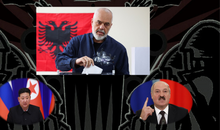



Risk of ethnic tensions, EU criticizes actions in northern Kosovo
2025-05-17 15:31:34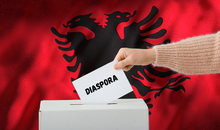
Manipulation of Diaspora votes in Greece/ Minutes prove distortion of results
2025-05-17 15:14:53
Heavy traffic in Tirana, long lines of cars on the Grand Ring Road
2025-05-17 14:52:24
May 11, Celibashi: 109 extra ballots are found, we are conducting verifications
2025-05-17 14:39:41


Green or yellow? This is the healthiest banana
2025-05-17 13:50:30


Berisha: The right of Albanians to vote as free citizens is our greatest goal
2025-05-17 13:03:20

Rei Nozllin punched the secretary of CEAZ No. 30 in Kashar, he is left in prison
2025-05-17 12:41:43
Caught with cannabis, two young people arrested in Tirana
2025-05-17 12:27:02
Topalli accuses of massive manipulation of votes from the Greek diaspora
2025-05-17 12:13:57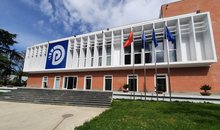
Vote counting from Greece, PD: Not to be included in the final result
2025-05-17 11:59:01

Ukraine peace talks, Macron: Faced with Putin's cynicism, Trump will react
2025-05-17 11:18:54
Criticism of Vjosa Osmani, Macron: I hope that dialogue will resume next week
2025-05-17 11:01:28
Dreams won't come true for others.
2025-05-17 10:41:56
Tonight's 'Eurovision 2025' final, Shkodra 'Elektronike' performs 26th
2025-05-17 10:23:07
Armored vehicle attacked with Kalashnikov rifle in Greece, driver escapes
2025-05-17 09:59:38
French President Macron arrives at the Prime Minister's Office, welcomed by Rama
2025-05-17 09:41:11

Foreign exchange/ How much foreign currencies are bought and sold today
2025-05-17 09:03:11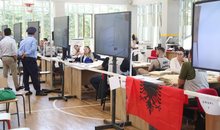
After limited success, new parties turn their eyes back to the electoral system
2025-05-17 08:54:39
"Relaxation is the motto", the stars' forecast for your sign
2025-05-17 08:38:32
Weather forecast for today
2025-05-17 08:25:13
Morning Post/ In 2 lines: What mattered yesterday in Albania
2025-05-17 08:00:30
Zhulali: Rama has transformed Albania's foreign policy into his personal policy
2025-05-16 22:57:14
EU concerned about recent operations in northern Kosovo
2025-05-16 22:42:45


VIDEO/ Rama kneels in Tirana, Meloni "puts in the scissors"
2025-05-16 21:48:15



Britain and North Macedonia reach agreement on strategic partnership
2025-05-16 21:07:11

Israeli forces do not stop barrage against Houthis, bombard port
2025-05-16 20:43:28
Two vehicles collide on the Laç-Patok axis, one of the drivers injured
2025-05-16 20:30:56
A couple of tourists from Arabia have an accident in Berat
2025-05-16 20:26:52


Danish Prime Minister: Rearmament of Europe should be everyone's priority
2025-05-16 19:59:28
They were distributing cocaine, the Italian-Albanian drug gang is arrested
2025-05-16 19:46:11

Why broccoli is one of the healthiest vegetables you can eat
2025-05-16 19:27:29

